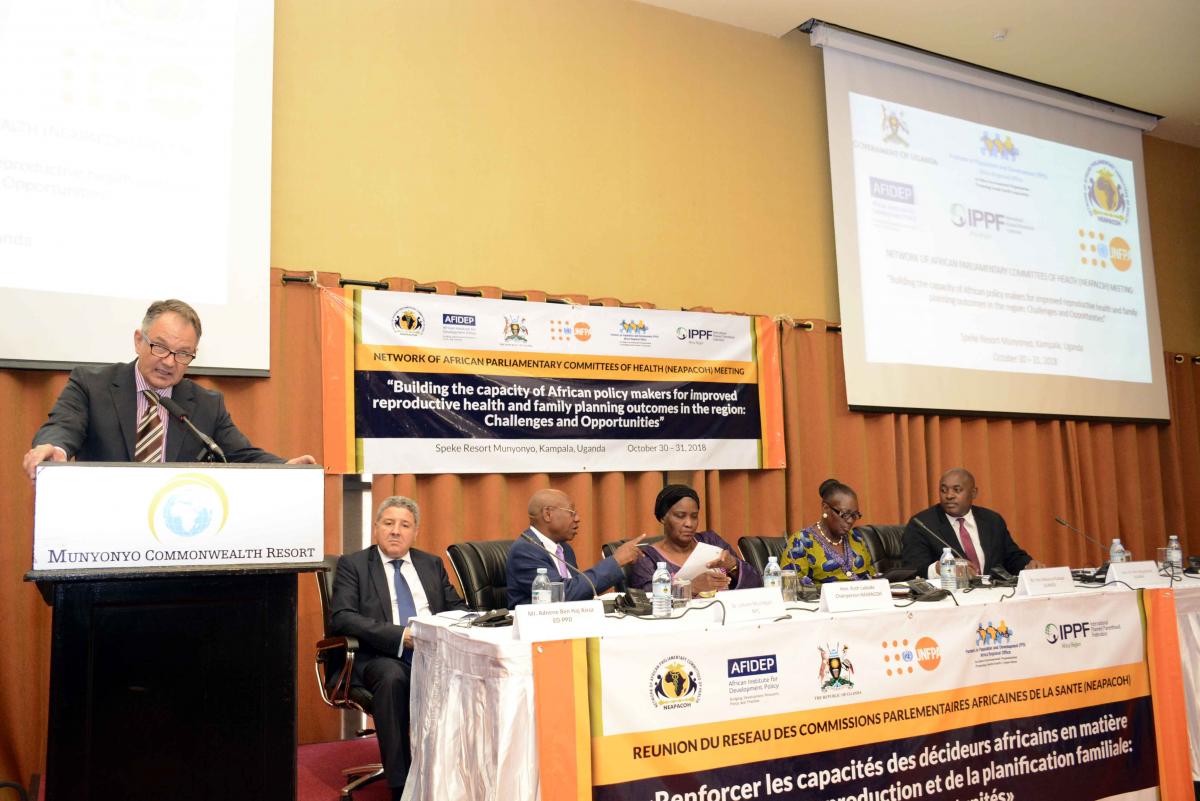
Summary: On March 31, 2021, the Parliament of Uganda passed a national health insurance bill that outlines the general structure for a first-ever national social health insurance scheme in Uganda [1]. It was passed with a pre-set benefits package that includes a range of essential health services including family planning counseling and services. The scheme will be financed by a combination of employee and government contributions, governed by a Board of Directors, and aims to cover all Ugandans when fully implemented. The specific policy and implementation details will evolve after the President agrees to sign it into law. This achievement comes after decades of engagement and consultations between civil society and government stakeholders.
Significance: Uganda is the only country in East Africa that has not passed a national health insurance scheme and has some of the highest out-of-pocket costs for health in the region. An estimated 38% percent of Uganda’s health expenditures are paid by individuals through out-of-pocket costs, followed by development partners (41%), the government (16%), and others (5%) [2]. Uganda’s current health insurance options are employer or community-based schemes and are estimated to cover less than 2% of the population [3]. Health insurers only contribute around 1% to health spending in Uganda [4]. In addition to covering more people, the newly passed scheme will allow insured clients to receive information and services in both the public and private sectors, increasing the accountability for providers to offer competitive and high-quality services.
Process: Discussions about national health insurance in Uganda started in the late 1980’s and evolved slowly over the years. Discussions accelerated in 2017, when Advance Family Planning local partner Partners in Population and Development – Africa Regional Office (PPD ARO) in partnership with stakeholders and with additional support from PAI and The William and Flora Hewlett Foundation worked to ensure family planning was included in the draft scheme’s benefits package. Together the coalition steered advocacy efforts to ensure family planning commodities and services were included throughout the scheme’s development process. Between 2016 and 2020, Parliamentary champions asked PPD ARO to organize a series of convenings with Members of Parliament, the Ministry of Health, Ministry of Finance, and the Uganda RMNCAH+N civil society platform to continue this momentum.
For three years in a row, Uganda’s Representatives in the Network of African Parliamentary Committees of Health – a regional entity – committed to passing the national health insurance scheme but struggled to get the Ministry of Health to draft and then introduce the bill to Parliament. In June 2019, Parliamentary champions sensed a stalling of the draft bill in the Ministry. They asked PPD ARO for technical support to inform a private member’s bill for Hon. Dr. Michael Bukenya, chairperson of the health committee. The introduction of the private member’s bill put pressure on the government to revive, update, and present their bill to Parliament in August 2019. The Ministry’s revised bill incorporated elements from the private member’s bill in its final form.
In February 2020, PPD ARO published an issue brief on the draft scheme and organized a series of media engagement activities to share the details and benefits of the scheme, including its coverage of family planning, with the public. This kept the issue central to Parliamentarians all over the country as the COVID-19 pandemic unfolded, challenging national health financing. Media were instrumental in keeping the pressure on Parliament to pass the bill, which finally happened on March 31, 2021.
Implications and Next Steps: Now that the scheme has passed in Parliament, more advocacy is needed to ensure that the President signs it in a timely manner. Private employers have publicly expressed opposition to the scheme, fearing that paying employees’ contributions would raise their cost of doing business. Advocates will continue to engage with the President to highlight the benefits of the national health insurance scheme; they also plan to maintain pressure to sign the bill by continuing media coverage and strategic messaging. When the bill does become law, civil society champions intend to remain engaged and support the scheme’s regulations process and implementation.
References:
- Bukenya, M. (2021, March 3). “SECOND READING OF THE NATIONAL HEALTH INSURANCE SCHEME BILL, 2019.” Kampala, Uganda. Parliament House. The Hansard of the Parliament of Uganda. 10th Parliament. Retrieved from: https://www.parliament.go.ug/documents/5017/hansards-2021-march
- World Health Organization Global Expenditure Database. (2018). Out-of-pocket payments, user fees and catastrophic expenditure. Retrieved from: https://data.worldbank.org/indicator/SH.XPD.OOPC.CH.ZS?locations=UG
- Basaza, R., Pariyo, G., & Criel, B. (2009). What are the emerging features of community health insurance schemes in East Africa? Risk management and healthcare policy, 2, 47–53. https://doi.org/10.2147/RMHP.S4347
- Ministry of Health National Financing Strategy 2015/16 – 2024/252016. Republic of Uganda. Retrieved from: http://library.health.go.ug/publications/health-financing-accounting/health-financing-strategy-201516-%E2%80%93-202425

